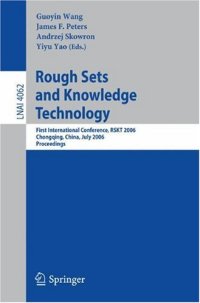
Ebook: Rough Sets and Knowledge Technology: First International Conference, RSKT 2006, Chongquing, China, July 24-26, 2006. Proceedings
- Genre: Education // International Conferences and Symposiums
- Tags: Artificial Intelligence (incl. Robotics), Information Storage and Retrieval, Database Management, Mathematical Logic and Formal Languages, Computation by Abstract Devices, Pattern Recognition
- Series: Lecture Notes in Computer Science 4062
- Year: 2006
- Publisher: Springer-Verlag Berlin Heidelberg
- Edition: 1
- Language: English
- pdf
This volume contains the papers selected for presentation at the First Int- national Conference on Rough Sets and Knowledge Technology (RSKT 2006) organized in Chongqing, P. R. China, July 24-26, 2003. There were 503 s- missions for RSKT 2006 except for 1 commemorative paper, 4 keynote papers and 10 plenary papers. Except for the 15 commemorative and invited papers, 101 papers were accepted by RSKT 2006 and are included in this volume. The acceptance rate was only 20%. These papers were divided into 43 regular oral presentation papers (each allotted 8 pages), and 58 short oral presentation - pers (each allotted 6 pages) on the basis of reviewer evaluation. Each paper was reviewed by two to four referees. Since the introduction of rough sets in 1981 by Zdzis law Pawlak, many great advances in both the theory and applications have been introduced. Rough set theory is closely related to knowledge technology in a variety of forms such as knowledge discovery, approximate reasoning, intelligent and multiagent systems design, and knowledge intensive computations that signal the emergence of a knowledge technology age. The essence of growth in cutting-edge, state-of-t- art and promising knowledge technologies is closely related to learning, pattern recognition,machine intelligence and automation of acquisition, transformation, communication, exploration and exploitation of knowledge. A principal thrust of such technologies is the utilization of methodologies that facilitate knowledge processing.
This book constitutes the refereed proceedings of the First International Conference on Rough Sets and Knowledge Technology, RSKT 2006, held in Chongqing, China in July 2006.
The 43 revised full papers and 58 revised short papers presented together with 15 commemorative and invited papers were carefully reviewed and selected from a total of 503 submissions. The papers are organized in topical sections on rough computing, evolutionary computing, fuzzy sets, granular computing, neural computing, machine learning and KDD, logics and reasoning, multiagent systems and Web intelligence, pattern recognition, system engineering and description, and real-life applications based on knowledge technology.